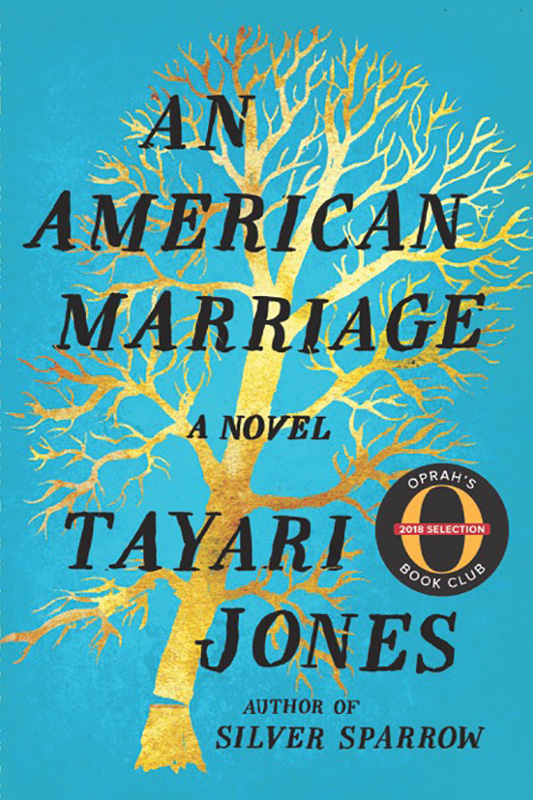It’s hard to hang up on someone in a satisfying way with a cell phone. That’s why Tayari Jones, author of An American Marriage, has an old rotary phone at her house. But Ms. Jones isn’t really the phone-slamming type; she just likes the option and the feel of what she calls heirloom technology.
She wrote her new novel on a typewriter. And she sends paper letters in paper envelopes to people in prison.
Especially for incarcerated people, the letter can be a tangible, tactile olive branch from the outside world. And for many African Americans in America, the divide between the inside and outside worlds are all too familiar. This divide is the essence of Ms. Jones’ novel, which she will discuss on August 16 at the Chilmark Community Center as part of the Martha’s Vineyard Author Series.
“In many ways, prison is the monster under the bed for African Americans, except there really is a monster under there,” Ms. Jones said during a recent phone call. This monster led Ms. Jones to spend many months as a fellow at the Radcliffe Institute at Harvard, researching race and the criminal justice system. But Ms. Jones says that deep down she’s not an ethnographer or a sociologist.
“I’m a storyteller. I had statistics that kept me up at night but what I didn’t have was a story.”
But then, the story came to her. “I actually overheard a couple arguing in the mall and I heard a woman say ‘Roy, you know you wouldn’t have waited on me for seven years.’”
From this brief exchange, the whole novel unfolded. The Roy in the mall became Roy O. Hamilton Jr. in the book, a man from Atlanta with his eyes set on the future. The woman became Roy’s wife, an artist named Celestial Davenport. Their story begins with their marriage and all the requisite joys and worries that go with it. The couple deals with imperfect family histories and the meaning of being black in America. But Celestial can feel that something ominous is waiting for them.
“You ever have a feeling like maybe you left the stove on?” she asks.
That something is the monster under their bed. And the bed is at The Piney Woods Motel, where they are staying when a woman in a nearby room accuses Roy of a rape that someone else committed. He is promptly plucked from his life and deposited in prison. From here, the couple must face their new realities, the heavy strain on their marriage and the meaning of being free or not free.
Although Roy is eventually released, his freedom doesn’t come when he walks out of the prison. Even though his accusation was false, he must live his life with a guilty verdict.
“Any accusation necessarily casts a shadow,” Ms. Jones said. “To even say, I am innocent implies that it is in doubt. There’s no way he can go back to where he was before all of this happened. There will always be a little asterisk beside his name. ”
While this contemporary story deals the American justice system, it’s also a love story with roots in ancient narratives. Ms. Jones looked to the story of Odysseus and Penelope for inspiration.
“Odysseus is away for all these years,” Ms. Jones said. “He has this hard journey back and all he wants to find on the other end is a faithful woman and a clean house, you know?” But part of the problem is that Roy wants what Odysseus wanted 2,500 years ago. “Roy wants her to not progress almost as a symbolic gesture toward him. It’s unreasonable.”
Ms. Jones says writing this book presented her with many struggles of her own. Her fast-paced life in New York made her feel like she had to cough up a book. When Ms. Jones was dealing with this pressure previously, while working on her third novel Silver Sparrow, she knew what do do.
“I had writer’s block and a friend had a condo in Vineyard Haven. She said, ‘Martha’s Vineyard is a magical place. Just go there and the book will happen.’ I went and the book happened.”
Did An American Marriage come just as easily?
“No,” she said. “I think this book could have really benefited from the Martha’s Vineyard cure.”
Nevertheless, Ms. Jones followed her characters through the maze of lawyers, love and serious heartbreak. The novel is partly composed of letters sent to and from prison. The rest of the narrative is trifurcated, with three unique voices and three unique interpretations of what it means to be black in America.
One of the reasons Ms. Jones included three narrative voices was to free each of them from having to act as a symbol of the African American experience. No one in the story has to carry that weight by themselves. The characters themselves feel undeniably alive, bringing the reader not into prison or race with a capital letter, but simply the intimate story of a family looking for hope.
And this was Ms. Jones’s goal. “As a writer, I try to make endings that I feel could happen. I’m not going to try to pull a happy or even hopeful ending in a place where I don’t see hope. So it took me a long time to try to figure out how a man can go forward after a wrongful incarceration.” Ms. Jones hopes that readers take something specific away from her book. “I hope that if you know someone who’s incarcerated, write that person a letter. Pick up a paper and pen, forget the email, send that person a letter in the mail.”
Tayari Jones will discuss her novel as part of the Martha’s Vineyard Author Series on Thursday, August 16 beginning at 7:30 p.m. at the Chilmark Community Center.







Comments
Comment policy »